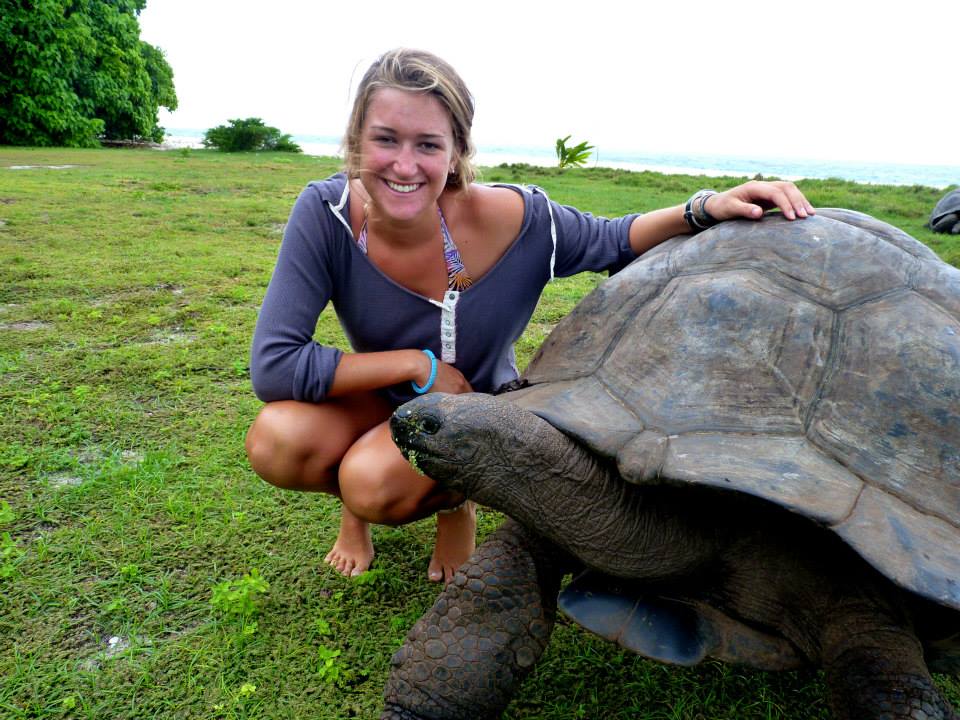Notes: PhD Researcher at the University of Exeter
 I come from very un-exotic roots, having been brought up by Scottish parents in the Scottish Borders. I am now a PhD researcher at the University of Exeter, working in the Environment and Sustainability Institute in Cornwall.
I come from very un-exotic roots, having been brought up by Scottish parents in the Scottish Borders. I am now a PhD researcher at the University of Exeter, working in the Environment and Sustainability Institute in Cornwall.
My research is in collaboration with the Vincent Wildlife Trust and Forestry Commission and is investigating the impact of re-introducing Pine Martens in Mid-Wales.
I have a BSc in Zoology from the University of Edinburgh and an MSc in Conservation & Biodiversity from the University of Exeter.
As well as English, have you learned, or do you speak, any other languages?
From a very young age my brother and I were encouraged to speak French by our mother. She was (and still is) a very proficient French-speaker, resulting in our family holiday destination always being France! French was also the language we were introduced to at primary and secondary school and I ended up studying it up to Scottish Higher level. I was keen to continue learning French at school but chose to focus on science.
Do you get the opportunity to go abroad as part of your job? If so, how do you communicate with people when you are there?
Studying and working in conservation provides lots of opportunities to go abroad. I have been  fortunate enough to travel widely during and between university terms, having undertaken volunteering, field research and training trips to Australia, South Africa, Kenya, the Seychelles and France.
fortunate enough to travel widely during and between university terms, having undertaken volunteering, field research and training trips to Australia, South Africa, Kenya, the Seychelles and France.
I spent a significant period of time during my MSc working in the French Pyrenees at the Centre National de la Recherche Scientifique. Here, I lived with primarily French students and researchers. I was at an advantage to the other UK students as I was able to chat and socialise with the French students quite easily. Often conversations would turn into a form of charades with dictionaries and notebooks being brought out, but it was a great learning experience. My French improved dramatically and I remain in contact with many of the people I met.
Do you have any memorable experiences of trying to communicate with a speaker of another language you would like to share with us?
 After my BSc I travelled to Kenya in a group of 10 European and 10 African students with the Tropical Biology Association to study savannah ecology. Since every student was from a different country we all spoke different languages, however we were expected to learn and communicate in English. Some individuals felt quite homesick and I realised it was tiring working in a foreign language all the time. Being able to sit down and chat in French to students from Madagascar, Cameroon and Switzerland was quite bizarre but I could see it meant a lot to them.
After my BSc I travelled to Kenya in a group of 10 European and 10 African students with the Tropical Biology Association to study savannah ecology. Since every student was from a different country we all spoke different languages, however we were expected to learn and communicate in English. Some individuals felt quite homesick and I realised it was tiring working in a foreign language all the time. Being able to sit down and chat in French to students from Madagascar, Cameroon and Switzerland was quite bizarre but I could see it meant a lot to them.
Do you think it is important to be able to speak other languages?
Most definitely. We are very fortunate that English is such an internationally used language and it is many foreigners’ second language. However, we should not take this for granted and I feel it is common courtesy to attempt to learn the language of other countries. Locals may find your attempts entertaining, but its actually a good ice breaker and a little bit of effort can go a long way.
Which language or languages have you found useful in your field of work?
I do think French is very useful, spoken not only in France but in Canada and many African countries (although I have found accents often difficult to understand). I do think Spanish would be equally as useful as it is widely spoken in the Americas.
Do you have a message to share about the importance and the benefits of language learning?
 Speaking another language really opens doors to new opportunities and enables you to meet and communicate with interesting people. Although you may be able to work abroad and continue speaking English, to integrate and enjoy yourself you should really attempt the local dialect. I have found that immersing yourself in a new language and culture is the best way to learn. Linguistic skills are definitely looked upon favourably in the job market, with so much work now being international. If combining work and travel is something that appeals to you, then having a second language definitely makes this possible.
Speaking another language really opens doors to new opportunities and enables you to meet and communicate with interesting people. Although you may be able to work abroad and continue speaking English, to integrate and enjoy yourself you should really attempt the local dialect. I have found that immersing yourself in a new language and culture is the best way to learn. Linguistic skills are definitely looked upon favourably in the job market, with so much work now being international. If combining work and travel is something that appeals to you, then having a second language definitely makes this possible.
Return to Job Profiles